News
Former Professor of the Biochemistry and Biophysics Department tapped to lead NIH
Wednesday, December 15, 2021

Larry Tabak, DDS, PhD
Dr. Larry Tabak, who was a past director of the center for oral biology, and a professor in the department of Biochemistry and Biophysics at the University of Rochester Medical Center has been appointed as interim director of the National Institutes of Health. Larry also served as Senior Associate Dean for Research at URMC. He was tapped to lead National Institute of Dental and Craniofacial Research in 2000, and has held other leadership posts at NIH.
Read More: Former Professor of the Biochemistry and Biophysics Department tapped to lead NIHChiang, Galardi and Schroeder Win the Sayeeda Zain Fall Travel Award
Friday, December 3, 2021
The Department is pleased to announce the winners of the Fall Sayeeda Zain Fall Travel Awards: Wesley Chiang, Justin Galardi and Griffin Schroeder.
The Sayeeda Zain Travel Award honors the distinguished career and charitable life of Dr. Sayeeda Zain. The award is given in recognition of research excellence to support expenses associated with attendance at a scientific conference or corporate internship to gain practical experience. The next round of Sayeeda Zain Travel Awards will be offered in Spring 2022.

Wesley Chiang

Justin Galardi

Griffin Schroeder
Thank you to all those who applied and congratulations to Wesley, Justin and Griffin!
RNA Presentation Contest: "Convince us why your favorite RNA or RNA-binding protein is worthy of our admiration" - January 2022
Friday, December 3, 2021
The UR Center for RNA Biology is running an RNA presentation contest, sponsored by the RNA Society and Lexogen, for graduate students, postdocs, and lab technicians on the topic: “Convince us why your favorite RNA or RNA-binding protein is worthy of our admiration”
Who is eligible: Any University of Rochester graduate student, postdoc, or lab technician with an interest in RNA biology (No need to be an RNA biologist. Previous contest winners also welcome to apply.)
Entry rules: Contestants for oral presentations will be chosen based on the scientific merit of their abstract (500-word max, excluding title, including references). To be considered for the oral competition, abstracts conforming to the rules, detailed below, must be submitted by 12pm on January 3rd.
Prizes: Three prizes of a one-year membership in the RNA Society plus $300 will be given to each of the three top oral presenters. Those who are already RNA Society members will be given membership for the following year. The prize funds should be used toward attending a research meeting.
Details: Contestants for oral presentation will be selected by an anonymous panel of faculty judges based on the scientific merit of their submission (500 words or fewer). In addition to the ~500-word description, please include your name, department, lab, status, year(s) at the UR, and if you were or are supported by a fellowship.
Those selected for the oral competition will give a 2-min intro of themselves, and an 8-minute science talk about their favorite RNA or RNA-binding protein followed by a 3-min Q&A session. Presentations will January 12th and 26th during the usual Department of Biochemistry & Biophysics Seminar Series on Wednesdays at 2pm (virtual or in-person TBD). Applicants and contestants should plan to be present for both January dates. Winners will be determined by the judges based on the quality of their presentations and their ability to address questions during the Q&A session.
Email submissions by 12pm on January 3rd to elizabeth_leverenz@urmc.rochester.edu.
Oral contestants will be notified by January 5th.
Congratulations Dr. Bryan!
Friday, November 12, 2021
 Michael Bryan successfully defended his thesis titled “Integrated Photonics for Point-of-Care Diagnostics“ on Friday, November 12th.
Michael Bryan successfully defended his thesis titled “Integrated Photonics for Point-of-Care Diagnostics“ on Friday, November 12th.
He is a graduate student in Dr. Ben Miller’s lab.
Biochemistry Alumni Gloria Culver, Dean of the School of Arts and Sciences, wins University of Rochester Medical Center’s Alumni Achievement Award
Tuesday, October 19, 2021
 Dr. Gloria Culver, Ph.D., who is Dean of the University of Rochester’s School of Arts and Sciences, and is also a graduate of the Biochemistry Ph.D. Program at the University of Rochester Medical Center, was recently awarded the URMC 2021 Alumni Achievement Award. Dr. Culver, performed her thesis research with Professor Eric Phizicky in the Department of Biochemistry (now the Department of Biochemistry and Biophysics), graduating in 1995. She did postdoctoral research with Dr. Harry Noller at the University of California, Santa Cruz, then took a tenure-track faculty position at the University of Iowa, as an Assistant Professor of Biochemistry, Department of Biochemistry, Biophysics and Molecular Biology.
Dr. Gloria Culver, Ph.D., who is Dean of the University of Rochester’s School of Arts and Sciences, and is also a graduate of the Biochemistry Ph.D. Program at the University of Rochester Medical Center, was recently awarded the URMC 2021 Alumni Achievement Award. Dr. Culver, performed her thesis research with Professor Eric Phizicky in the Department of Biochemistry (now the Department of Biochemistry and Biophysics), graduating in 1995. She did postdoctoral research with Dr. Harry Noller at the University of California, Santa Cruz, then took a tenure-track faculty position at the University of Iowa, as an Assistant Professor of Biochemistry, Department of Biochemistry, Biophysics and Molecular Biology.
In 2007 she was recruited to the University of Rochester as Associate Professor in the Department of Biology, where she eventually was promoted to Professor (2009) and Chair (2010). She was appointed Dean of the School of Arts and Sciences in 2015. Culver received her BA in biology from Ithaca College in 1988.
The award was presented at the annual Dean’s Circle Alumni Council Awards Ceremony, September 30th, by Dr. Mark Taubman, Dean of the School of Medicine and Dentistry and CEO of the University of Rochester Medical Center.
Congratulations Gloria!
New lizard facility in Department of Biochemistry and Biophysics
Thursday, October 14, 2021
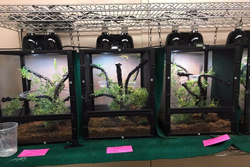 University of Rochester Medical Center’s first lizard facility began operation last week in the Medical Annex building. The facility was built and is operated under the direction Dr. Xin Li, and the the Li Lab within URMC’s Department of Biochemistry and Biophysics. The facility will work with Anolis carolinensis, also known as the Californian Anole or Green Anole, and will focus on studying the unique anatomy and molecular biology found within this species of lizard. The facility is currently being used in Dr. Li’s pilot course for undergraduate independent research entitled Lizard Research and will focus on breeding a population of Anoles for URMC along with running undergraduate research projects involving the lizards. This facility will take advantage of the recent discovery that CRISPR-Cas techniques can be used to modify Anole embryos, opening up the species as a model for genetic and biochemical experiments. Dr. Li hopes to expand this facility in the future and increase the use of Anolis carolinensis as a model organism in scientific research here at URMC.
University of Rochester Medical Center’s first lizard facility began operation last week in the Medical Annex building. The facility was built and is operated under the direction Dr. Xin Li, and the the Li Lab within URMC’s Department of Biochemistry and Biophysics. The facility will work with Anolis carolinensis, also known as the Californian Anole or Green Anole, and will focus on studying the unique anatomy and molecular biology found within this species of lizard. The facility is currently being used in Dr. Li’s pilot course for undergraduate independent research entitled Lizard Research and will focus on breeding a population of Anoles for URMC along with running undergraduate research projects involving the lizards. This facility will take advantage of the recent discovery that CRISPR-Cas techniques can be used to modify Anole embryos, opening up the species as a model for genetic and biochemical experiments. Dr. Li hopes to expand this facility in the future and increase the use of Anolis carolinensis as a model organism in scientific research here at URMC.
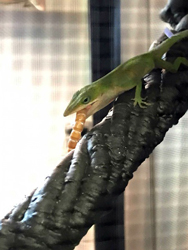

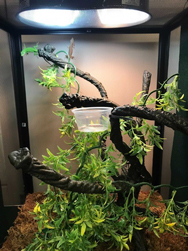
Yu Sun Defends PhD Thesis and wins Prestigious Award
Thursday, October 14, 2021
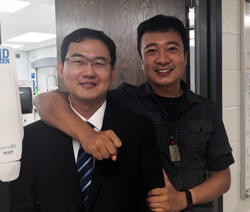 Yu Sun, a PhD student in Prof. Xin Li’s lab, who successfully defended his thesis September 2nd, was awarded the highly prestigious Chinese Government Award for graduate students studying abroad. The Chinese Government award recognizes exceptional achievement in academic accomplishment by Chinese students, and Yu was selected for this award among tens of thousands of other students. Only 500 students from all fields of study and all over the world are selected for the award each year. Yu was recognized for the advancements made in his thesis research, resulting in 12 research papers in top journals, including papers in Nature Cell Biology, Nature Communications, eLife, Biology of Reproduction, and Poultry Science.
Yu Sun, a PhD student in Prof. Xin Li’s lab, who successfully defended his thesis September 2nd, was awarded the highly prestigious Chinese Government Award for graduate students studying abroad. The Chinese Government award recognizes exceptional achievement in academic accomplishment by Chinese students, and Yu was selected for this award among tens of thousands of other students. Only 500 students from all fields of study and all over the world are selected for the award each year. Yu was recognized for the advancements made in his thesis research, resulting in 12 research papers in top journals, including papers in Nature Cell Biology, Nature Communications, eLife, Biology of Reproduction, and Poultry Science.
Congratulations Yu Sun!
Lynne Maquat spoke with WXXI: 'A wave of the future': local biologist explores what's next for mRNA technology
Wednesday, September 8, 2021
The recent approval of Pfizer and BioNTech’s COVID-19 vaccine by the U.S. Food and Drug Administration, has scientists enthusiastic about the future of the messenger RNA, or mRNA, technology used to produce the vaccine. For RNA biologists, in particular, the pandemic has become a catalyst for modern medicine. “It's a big step forward for mRNA-based therapeutics,” said UR Medicine’s director for centers for RNA biology, Dr. Lynne Maquat. “We've had a worldwide need. And the need has been met.”
Maquat defines mRNA as the messenger molecule between our DNA, and the proteins that our cells need to perform their duties. She says the COVID-19 vaccine produces a piece of the spike protein that surrounds the coronavirus and raises an immune response to it.
“Our immune system will attack the virus, because the spike protein is on the outside of the virus,” said Maquat.
She says the success of the Pfizer and Moderna vaccines is causing scientists to look at other illnesses that could benefit from the mRNA technology like dengue.
“There's lots of infectious diseases, especially in Third World countries that need to be addressed,” Maquat said.
UR Medicine infectious disease specialist Dr. Edward Walsh says existing vaccines can also benefit from messenger RNA.
“If an mRNA vaccine for the influenza vaccine could reach the kind of efficacy data, especially over a six-month period, we really only need to get protection for about six months through the flu season each year,” Walsh said.
He said the flu vaccine is roughly 60% effective, but mRNA technology could increase that...
“If we could get that very high degree of efficacy, it could really do a lot of public health good,” said Walsh.
Maquat said she and her team are already looking at how some cancers could be treated with messenger RNA technology
“Let's say you have a pancreatic cancer,” said Maquat, “you could have your tumor removed, and you can have it characterized for new proteins.”
The new discovered proteins in the tumor would allow scientists to develop an mRNA treatment to combat that protein.
“It's a type of personalized medicine,” said Maquat. "This is a wave of the future"
Read More: Lynne Maquat spoke with WXXI: 'A wave of the future': local biologist explores what's next for mRNA technologyBiochemistry and Molecular Biology Student Maddie Jensen Featured by Cold Spring Harbor Laboratory Blog
Friday, September 3, 2021
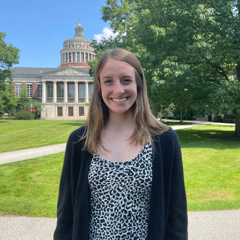 Maddie Jensen, a BMB student in Eric Wagner’s lab at the University of Rochester Medical Center was recently featured as a ‘Visitor of the Week' in the Current Exchange, a Blog by the CSHL Meetings and Courses Program. Maddie attended the Eukaryotic mRNA Processing meeting where she was presenting a poster entitled "Identification and structural basis of a novel cellular inhibitor of the Integrator complex.” Maddie and the Wagner lab moved to the University in August 2021 from the University of Texas Medical Branch at Galveston, joining the Department of Biochemistry and Biophysics, The Wilmot Cancer Institute, and the RNA Center at the University of Rochester Medical Center. The article, which explored Maddie’s research, her journey as a scientist, and her experiences at the meeting, can be found here: https://currentexchange.cshl.edu/blog/2021/8/visitor-of-the-week-209.
Maddie Jensen, a BMB student in Eric Wagner’s lab at the University of Rochester Medical Center was recently featured as a ‘Visitor of the Week' in the Current Exchange, a Blog by the CSHL Meetings and Courses Program. Maddie attended the Eukaryotic mRNA Processing meeting where she was presenting a poster entitled "Identification and structural basis of a novel cellular inhibitor of the Integrator complex.” Maddie and the Wagner lab moved to the University in August 2021 from the University of Texas Medical Branch at Galveston, joining the Department of Biochemistry and Biophysics, The Wilmot Cancer Institute, and the RNA Center at the University of Rochester Medical Center. The article, which explored Maddie’s research, her journey as a scientist, and her experiences at the meeting, can be found here: https://currentexchange.cshl.edu/blog/2021/8/visitor-of-the-week-209.
Department of Biochemistry and Biophysics welcomes Eric Wagner to the University of Rochester
Friday, September 3, 2021
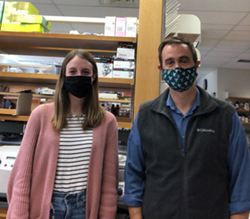 We are thrilled to officially announce the arrival of Professor Eric Wagner, Ph.D., to the University of Rochester Medical Center, with appointments in the Department of Biochemistry and Biophysics, the Wilmot Cancer Center and the RNA Center. Eric moved here from the University of Texas, Medical Branch at Galveston, where he was a Professor and Vice-Chair for Education in the Department of Biochemistry and Molecular Biology. Eric is originally from Buffalo, NY and an alumnus of the University of Rochester (BS ’97, Molecular Genetics). Eric’s research program focuses on the molecular mechanism of RNA processing as it relates to human disease. Specifically, his lab will continue their investigations into the Integrator Complex and alternative polyadenylation. Eric’s office and the lab is located on the ground floor of the Kornberg Medical Research building.
We are thrilled to officially announce the arrival of Professor Eric Wagner, Ph.D., to the University of Rochester Medical Center, with appointments in the Department of Biochemistry and Biophysics, the Wilmot Cancer Center and the RNA Center. Eric moved here from the University of Texas, Medical Branch at Galveston, where he was a Professor and Vice-Chair for Education in the Department of Biochemistry and Molecular Biology. Eric is originally from Buffalo, NY and an alumnus of the University of Rochester (BS ’97, Molecular Genetics). Eric’s research program focuses on the molecular mechanism of RNA processing as it relates to human disease. Specifically, his lab will continue their investigations into the Integrator Complex and alternative polyadenylation. Eric’s office and the lab is located on the ground floor of the Kornberg Medical Research building.
Two members of Eric’s lab also moved to Rochester, postdoctoral fellow Kai-Lieh (Frank) Huang, Ph.D., and Maddie Jensen (pictured), a second year student now in the Biochemistry Ph.D. program.
Please join us in welcoming Eric, Kai-Lieh and Maddie!
Jermaine Jenkins, Ph.D, Appointed as an Assistant Professor in Biochemistry and Biophysics
Tuesday, July 27, 2021
 Dr. Jermaine Jenkins, Ph.D. was appointed recently as an Assistant Professor in the Department of Biochemistry and Biophysics, in recognition of his numerous contributions to sponsored research projects that require his expertise in the area of structural biology and biophysics. Dr. Jenkins will continue serving as Director of the Structural Biology and Biophysics Facility, where he provides expertise and services for in-house, state-of-the-art instruments to determine macromolecular x-ray crystal structures, and to investigate protein-protein, protein-nucleic acid, or protein-small molecule interactions. Going forward, Dr. Jenkins will be instrumental in driving research efforts including cryo-electron microscopy at our institution.
Dr. Jermaine Jenkins, Ph.D. was appointed recently as an Assistant Professor in the Department of Biochemistry and Biophysics, in recognition of his numerous contributions to sponsored research projects that require his expertise in the area of structural biology and biophysics. Dr. Jenkins will continue serving as Director of the Structural Biology and Biophysics Facility, where he provides expertise and services for in-house, state-of-the-art instruments to determine macromolecular x-ray crystal structures, and to investigate protein-protein, protein-nucleic acid, or protein-small molecule interactions. Going forward, Dr. Jenkins will be instrumental in driving research efforts including cryo-electron microscopy at our institution.
Congratulations JJ!
Former Student Jerry Madukwe is appointed Editor-In-Chief of Trends in Pharmacological Sciences
Tuesday, July 27, 2021
 Jerry Madukwe, who received his Ph.D. in Biochemistry from the University of Rochester in 2018, has been hired as the Editor-in-chief of the Cell Press journal Trends In Pharmacological Sciences. Jerry received his BS in Biochemistry (magna cum laude) from Lee University in Tennessee, and doctorate in Biochemistry studying the role of cell signaling via tyrosine receptor kinases in cancer and cardiovascular disease. He completed a postdoctoral fellowship at Yale University in Pharmacological Biochemistry, then was a Washington Policy Fellow of the American Society for Pharmacology and Experimental Therapeutics, where he advocated for science funding and younger scientists at the US Capitol.
Jerry Madukwe, who received his Ph.D. in Biochemistry from the University of Rochester in 2018, has been hired as the Editor-in-chief of the Cell Press journal Trends In Pharmacological Sciences. Jerry received his BS in Biochemistry (magna cum laude) from Lee University in Tennessee, and doctorate in Biochemistry studying the role of cell signaling via tyrosine receptor kinases in cancer and cardiovascular disease. He completed a postdoctoral fellowship at Yale University in Pharmacological Biochemistry, then was a Washington Policy Fellow of the American Society for Pharmacology and Experimental Therapeutics, where he advocated for science funding and younger scientists at the US Capitol.
UR Graduate Women in Science (GWIS) 2021 Mentoring-Up Resolution Challenge CONTEST RESULTS
Monday, May 24, 2021
Congratulations, Mentoring-Up Resolution Challenge Winners!
Full-time UR grad students (gender-inclusive) in biomedical, biological, or chemical sciences took charge of their futures by setting and, through mentoring-up, achieving professional and personal goals for Spring 2021. Participants submitted their goals in a January write-up and progress reports on their professional goals in May. The anonymous faculty evaluation committee selected finalists to present on May 20th. All four presenters were selected to win $1500 ea. in technology-related (hardware, software, and/or peripherals) prizes. Of note, submissions for this contest were received from graduate students of 12 different programs!
Graduate Women in Science Receives 2021 Best of Rochester Award
Tuesday, May 4, 2021
Graduate Women in Science has been selected for the 2021 Best of Rochester Award in the University category by the Rochester Award Program.
Each year, the Rochester Award Program identifies companies that we believe have achieved exceptional marketing success in their local community and business category. These are local companies that enhance the positive image of small business through service to their customers and our community. These exceptional companies help make the Rochester area a great place to live, work and play.
Various sources of information were gathered and analyzed to choose the winners in each category. The 2021 Rochester Award Program focuses on quality, not quantity. Winners are determined based on the information gathered both internally by the Rochester Award Program and data provided by third parties.
About Rochester Award Program
The Rochester Award Program is an annual awards program honoring the achievements and accomplishments of local businesses throughout the Rochester area. Recognition is given to those companies that have shown the ability to use their best practices and implemented programs to generate competitive advantages and long-term value.
The Rochester Award Program was established to recognize the best of local businesses in our community. Our organization works exclusively with local business owners, trade groups, professional associations and other business advertising and marketing groups. Our mission is to recognize the small business community's contributions to the U.S. economy.
Lynne Maquat Wins Warren Alpert Foundation Prize
Monday, May 3, 2021
Lynne Maquat, Ph.D., the founding director of the Center for RNA Biology at the University of Rochester, has been awarded the Warren Alpert Foundation Prize for her pivotal discoveries in the field of RNA biology. She shares the prize with fellow RNA biologist Joan Steitz, Ph.D., Sterling Professor of Molecular Biophysics and Biochemistry at Yale School of Medicine.
The award is given by the Warren Alpert Foundation in recognition of work that has improved the understanding, prevention, treatment or cure of human disease. The prize is administered by Harvard Medical School, and since its inception in 1987, 12 honorees have gone on to receive Nobel prizes.
George Q. Daley, dean of Harvard Medical School, said of Maquat and Steitz: "The discoveries made by the two award winners are stunning in their elegance and scope." Earlier this year, the pair won the 2021 Wolf Prize in Medicine for their work. They shared the Wolf Prize with a third RNA biologist, Adrian Krainer, Ph.D., of Cold Spring Harbor Laboratory.
RNA Makes its Mark
Maquat has studied RNA since she started her own laboratory in 1982. But until the development and approval of multiple mRNA COVID-19 vaccines in 2020, RNA wasn't on the public radar. Decades of research by Maquat and Steitz on how RNAs work and how they are involved in human disease helped set the stage for the rapid development of these vaccines, which are key to bringing the COVID pandemic under control.
Many are familiar with DNA, which contains the genetic instructions that make us who we are. But RNA is equally important in the process of gene expression:
- DNA lives in the nucleus of a cell and makes many types of RNA, including mRNA (messenger RNA).
- mRNA takes genetic instructions from DNA, travels out of the nucleus and delivers them to factories in our cells called ribosomes.
- Ribosomes use the instructions to create proteins.
- Proteins carry out myriad functions throughout the body, including ferrying nutrients around, helping with chemical reactions and protecting us from disease.
Many disorders result from problems with our DNA, but over the past several decades Maquat, Steitz and other scientists revealed that mRNA plays a role in a multitude of diseases, too. Cystic fibrosis, fragile X syndrome, Duchene muscular dystrophy and a long list of other inherited and acquired diseases result from defective mRNAs.
"Scientists used to think that gene regulation was all about DNA, and that RNA didn't influence gene expression, the production of proteins or the development of disease," said Maquat, the J. Lowell Orbison Endowed Chair and Professor of Biochemistry and Biophysics, Oncology and Pediatrics at the University of Rochester School of Medicine and Dentistry. "We now know that a very complicated network exists in our cells to regulate how, when and where our mRNAs are produced. This knowledge has opened the door to using RNA as both a treatment target and a tool to develop new therapies."
OyaGen announces a license agreement to develop SARS CoV-2 inhibitor
Tuesday, April 20, 2021

Dr. Harold Smith
OyaGen, a start-up biotech company founded by Harold Smith, Ph.D., Professor of Biochemistry and Biophysics, announced on Monday a licensing agreement with Tonix Pharmaceuticals to develop a drug that was found to be an effective agent against the virus that causes COVID-19. The drug, TNX-3500, was found to block SARS-CoV-2 with an efficacy significantly greater than the current front-line anti-viral used in the clinic, remdesivir. Harold Smith, PhD, Chief Executive Officer and founder of OyaGen, remarked that "We're delighted to partner with Tonix as a clinical stage company on the development of TNX-3500 as we believe Tonix to be ideally capable to bring this drug lead to the clinic in rapid fashion and position it for worldwide commercialization." Tonix Pharmaceuticals Holding Corp. (Nasdaq: TNXP), a clinical-stage biopharmaceutical company, is located in Chatham, NJ. For more information please contact Dr. Smith at Harold.smith@rochester.edu
Hilf Article in Analytical Biochemistry Read Over 2000 Times
Friday, March 26, 2021
Congratulations to Biochemistry & Biophysics Professor Russell Hilf, Ph.D., as his paper, Fluorimetric method for determination of oxidized and reduced glutathione in tissues, has been read over 2,000 times and cited over 3500 times!
Paul Boutz lands first NIH R01 at Rochester
Tuesday, March 2, 2021

Paul Boutz, PhD
Congratulations to Paul Boutz, who received official word that his first NIH R01 application as a faculty member in the Department of Biochemistry and Biophysics at the URMC was funded. Dr. Boutz's project is entitled "Genomics-based approaches to understanding mechanistic alterations of spliceosome function in disease states" and earned a 12th percentile ranking, meaning the grant application was rated as better than 88% of all other grant applications. The goal of this project is to model genetic perturbations found in cancer and developmental disorders in order to understand how they alter spliceosome function. Conventional and novel RNA sequencing methods will be used to generate genome-wide maps of splicing and RNA-protein interactions that will enable the training of deep-learning neural networks, with the goal of deciphering the codes that confer gene-specific sensitivity to disease-causing mutations.
Congratulations Paul!
Wedekind lab research featured on the cover of JBC “The Year in JBC: 2020" issue
Friday, February 12, 2021
Congratulations to Shashank Chavali, Dr. Sachitanand Mali, Dr. Jermaine Jenkins, Dr. Rudi Fasan, and Dr. Joseph Wedekind for being featured on the cover of JBC "The Year in JBC: 2020" issue. Their recent research article, published in the Journal of Biological Chemistry (JBC) December 4, 2020 issue, titled "Co-crystal structures of HIV TAR RNA bound to lab-evolved proteins show key roles for arginine relevant to the design of cyclic peptide TAR inhibitors" has been selected as the representative 'RNA' article for 2020 retrospective collection called "The Year in JBC: 2020."
The cover art below, shows a collage of fluorescence complementation experiments between the [4Fe-4S]-transferring NFU1 and potential partners (performed by Roland et al.), crystal structure overlays of HIV-1 TAR RNA with lab-evolved TAR-binding proteins (reported by Chavali et al.), nonmelanized yeast cells (explored by Chrissian et al.) and a cryo-EM structure of STEAP1, now thought to function as a ferric reductase in heterotrimer form (reported by Oosterheert and Gros). Artwork created by EJ Marklin.
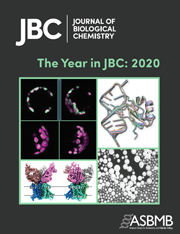
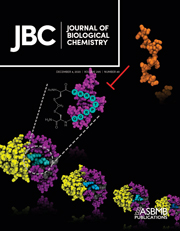
Read More: Wedekind lab research featured on the cover of JBC "The Year in JBC: 2020" issue
Lynne Maquat Awarded 2021 Wolf Prize in Medicine
Tuesday, February 9, 2021
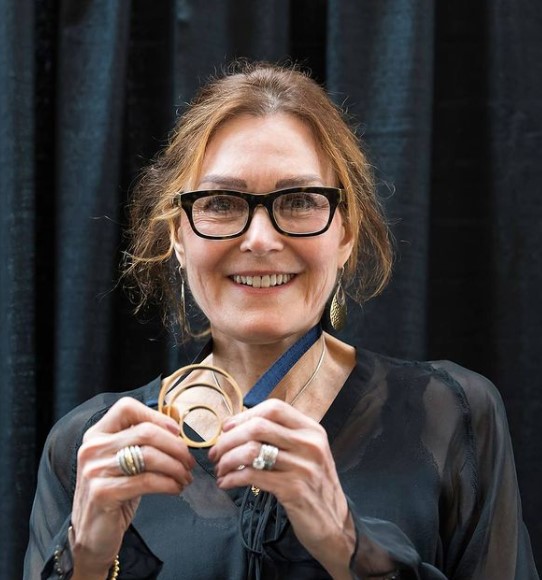
Lynne E. Maquat, Ph.D., the founding director of the Center for RNA Biology at the University of Rochester, was honored with the 2021 Wolf Prize in Medicine. The acclaimed international award is given to outstanding scientists from around the world for achievements that benefit mankind.
Maquat was selected for "fundamental discoveries in RNA biology that have the potential to better human lives." She has spent her career deciphering the many roles that RNA plays in sickness and in health, and is well known for her discovery of nonsense-mediated mRNA decay or NMD. One of the major surveillance systems in the body, NMD protects against mistakes in gene expression that lead to disease. Maquat's lab also revealed that NMD helps our cells adjust to changes in development and in their environment, and more rapidly respond to certain stimuli.
Maquat shares the award with Joan Steitz, Ph.D., Sterling Professor of Molecular Biophysics and Biochemistry at Yale School of Medicine and Adrian Krainer, Ph.D., St. Giles Foundation Professor and Cancer Center Deputy Director of Research at Cold Spring Harbor Laboratory. Steitz and Krainer were also honored for discoveries in RNA biology.
The Wolf Foundation, which celebrates exceptional achievements in the sciences and the arts, is based in Israel, where Maquat's quest to unravel the intricacies of NMD began. In 1980 she traveled to Jerusalem to retrieve bone marrow samples from four children suffering from thalassemia major, the most severe form of the inherited blood disorder thalassemia. Maquat wanted to learn why the children's marrow contained no beta-globin protein, which is necessary for the oxygen-carrying function of red blood cells. Her 1981 breakthrough manuscript, "Unstable beta-globin mRNA in mRNA-deficient beta0 thalassemia," published in Cell, was the first to reveal the role of NMD in human cells and how it can lead to disease.
"Lynne's work on nonsense-mediated mRNA decay is the bedrock of an ever-growing body of research on how mRNAs are monitored and regulated," said Mark B. Taubman, M.D., dean of the University of Rochester School of Medicine and Dentistry. "Her dedication to her science and to the field of RNA biology has opened the door to the development of RNA-based therapeutics for a wide range of disorders that you can't reach with conventional drugs. We're thrilled that her contributions are being recognized with this prestigious award."
RNA secured its place in the public eye in 2020 with the development and approval of multiple mRNA COVID-19 vaccines. Years of research by Maquat, Steitz and Krainer helped set the stage for the rapid development of these vaccines.
The J. Lowell Orbison Endowed Chair and Professor in the Department of Biochemistry and Biophysics at the University of Rochester School of Medicine and Dentistry, Maquat is the recipient of several other significant honors, including:
- Wiley Prize in Biomedical Sciences (2018)
- Vanderbilt Prize in Biomedical Science (2017)
- Canada Gairdner International Award (2015)
- RNA Society's Lifetime Achievement Awards in Service (2010) and in Science (2017)
- Election to the National Academy of Medicine (2017), the National Academies of Sciences (2011) and the American Academy of Arts and Sciences (2006) More about Nonsense-Mediated mRNA Decay
Winners of the Wolf Prize are selected annually by an international jury committee of the Wolf Foundation; prizes are awarded regardless of religion, gender, race, geographical region, or political view. The official announcement of this year's prize by the President of the State of Israel, Reuven Rivlin, was made on February 9, 2021.
UR Center for RNA Biology RNA Presentation Contest Results
Tuesday, February 2, 2021
Thank you to those who participated in and/or viewed the UR Center for RNA Biology's RNA Presentations on Jan 6th, 13th, and 27th, sponsored by the RNA Society and Lexogen. The judging committee was impressed with the quality of the presentations given on all three dates, making final decisions difficult.
All nine of the graduate student, postdoc, and technician presenters, chosen based on their quality of their abstract, will be receiving a one-year membership to the RNA Society. Of these, four who were chosen based on the quality of their presentation will be awarded $375 each to be used toward the attendance of an RNA-centric meeting, in person or virtually.
The four to be awarded a one-year membership in the RNA Society and $375, in alphabetical order, are:
Kamel Awayda (presented Jan 6th )
Technician, Mitch O'Connell Lab
"Characterization of THUMP Domain-Containing Protein 1, and Putative Modulator of RNA Modification"
Chen Bao (presented Jan 13th)
Biochemistry Grad Student, Dmitri Ermolenko Lab
"mRNA Stem-Loops Can Induce Translational Pause through Two Pathways"
Xavier Rambout, PhD (presented Jan 27th)
Postdoc, Lynne Maquat Lab
"Transcriptional Coactivator PGC-1α Contains a Novel CBP80-Binding Motif that Orchestrates Efficient Target-Gene Expression"
Arica VanderWal (presented Jan 13th)
Biochemistry Grad Student, Mitch O'Connell Lab
"The Role of Csx28 in CRISPR-Cas13b Anti-Bacteriophage Defense"
The remaining to be awarded a one-year membership in the RNA Society, in alphabetical order, are:
Lily Cisco (presented Jan 6th )
Pharm-Phys Grad Student, John Lueck Lab
"Testing Therapeutic Intervention for Myotonic Dystrophy Type 1 in a Novel Mouse Model"
Xueyang He (presented Jan 6th )
Biophysics Grad Student, Paul Boutz Lab
"A Novel Method to Capture and Sequence Intron Lariats"
Shon Koren (presented Jan 6th )
Technician, Gail Johnson Lab
"Tau-Ribosome-tRNA Associations Underlie Common Features of Dys sincening Protein Synthesis in Dementia"
Sean Lindley (presented Jan 13th )
Biology Grad Student, Doug Anderson Lab
"StitchR: Ribozyme-Mediated RNA Trans-Splicing and Expression in Mammalian Cells"
Debanjana Maji (presented Jan 27th )
Biophysics Grad Student, Clara Kielkopf Lab
"Representative Cancer-Relevant U2AF2 Mutations Alter RNA Interactions and Splicing"
Beneath the Surface of Fragile X Syndrome: Study Sheds Light on What’s Happening in Nerve Cells
Monday, January 25, 2021
A new study shows that many abnormalities in fragile X syndrome cells are related to glitches with one of the body's major quality control systems. Published in Nature Cell Biology, the research provides fresh insight into the molecular mechanisms of the disorder and a pathway to search for potential treatments.
Fragile X syndrome occurs when individuals don't make the fragile X protein known as FMRP, which is needed for normal brain development. Currently, little is known about how the loss of this crucial protein leads to the intellectual disability and severe learning problems characteristic of the disease.
Rochester researchers found that many irregularities in cells that lack FMRP are due to misregulated nonsense-mediated mRNA decay, or NMD. Discovered by RNA biologist Lynne E. Maquat, Ph.D., NMD is like a molecular guide that helps our cells make smart decisions that (in most cases) improve cellular function and contribute to good health. For example, NMD helps our cells adjust to changes in development and in their environment, and more rapidly respond to certain stimuli.
Through a series of cellular analyses, Maquat's team discovered that NMD influences a wide range of genes throughout the brain, including genes that govern motor control and cognitive processes related to attention, learning and language. They also found that when FMRP is absent from cells, as it is in people with fragile X syndrome, nonsense-mediated mRNA decay shifts into overdrive.
New Research Funding Initiative to Support Young Investigators
Friday, January 15, 2021
Thanks to a partnership between pediatric researchers and the GCH Advancement division, a new funding initiative will seek to provide $25,000 -- matched with grant funds -- to support individual young investigators who are undertaking pediatric research.
These young investigators would be tenure-track assistant professors or post-doctoral fellows who already have a PhD degree and are on the path to obtain a tenure track position. This type of "seed" funding will be critical for fostering the careers of young researchers at URMC and could potentially pay dividends for institutional growth in the long-term, according Tom Mariani, PhD, professor of Neonatology and director of research for the Department of Pediatrics.
"In addition to funding discovery and innovation which could potentially save millions of lives, the career development of one investigator can be leveraged many times over to merit additional external funding, creation of new labs, and stimulate economic growth in the Rochester community."
Alan Wood, owner of the Realty company RE/Max Plus and supporter of GCH, and Lynne Maquat, PhD, endowed chair and professor in the Departments of Biochemistry and Biophysics, Oncology, and Pediatrics, developing this funding idea after Wood and his children visited Maquat's Fragile X Syndrome lab this Fall. Fragile X Syndrome is the most common single-gene cause of autism and intellectual disability, and Wood's family got a thorough education on the scope of Maquat's work, which is examining disease-causing mutations in children, and what those mutations do to gene expression via RNA production.
"My children loved getting first-hand experience touring the lab and seeing real-world visualizations of the work Maquat and her team are doing. Wearing lab coats and gloves, they isolated genetic material from bananas, which turn out to have more genetic material than us humans," said Wood.
Wood will be leading the effort to develop the program and secure funding. Donors who sponsor a young investigator will be able to establish a relationship to learn more about their research as it evolves.
"We have several talented young researchers in the Department of Pediatrics," said Maquat, "providing early support for their career is a long-term goal. The results won't be immediate, but over time, this support will build the foundation for discovery that will improve kids' lives."
Alan Grossfield Featured in Biophysical Society Profile
Monday, January 11, 2021

Biochemistry and Biophysics Professor Alan Grossfield was recently featured in a two-page profile piece in the January 2021 Biophysical Society Bulletin. The article details how Dr. Grossfield developed an interest in science and progress from an undergraduate biology major to ultimately making a career in computational studies of biological systems. The entire article can be found here: https://biophysics.cld.bz/Biophysical-Society-Bulletin-January-2021/4/#zoom=z